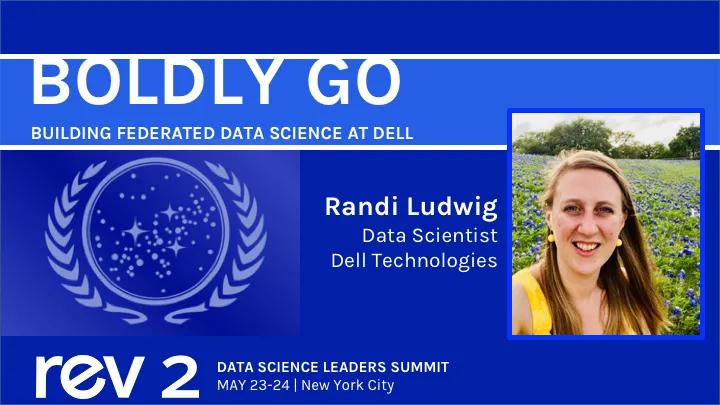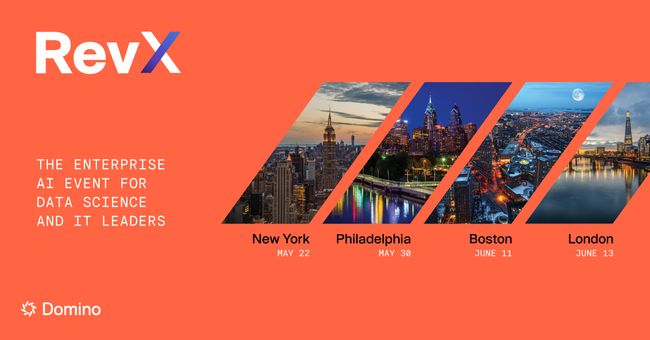Dell's Randi Ludwig Shares Her Perspective on Data Science Teams
Karina Babcock2019-04-05 | 7 min read

Several months back, Domino and Dell teamed up to host a Data Science Pop-up in Austin, Texas. During that event, Dell Data Scientist Randi Ludwig shared her insights into fostering a collaborative environment that nurtures a loyal data science team. This blog recaps Randi’s Data Science Pop-up talk about data science communities, and looks ahead to her presentation at the Rev 2 Summit for Data Science Leaders about federated data science team structures.
Randi started her Data Science Pop-up session highlighting her background in education and experience with various learning styles to emphasize that individuals learn by doing or teaching others about a topic. This insight into learning is important as she discusses trust, open lines of communication, and incentivizing teams and individuals to participate as three foundational elements to building successful data science teams.
Build Trust
To build trust in the workplace, employers need to create an environment where a community can thrive. In this case, creating a community of data scientists requires the opportunity for them to engage, get to know one another, troubleshoot, and ultimately teach and learn from one another. Randi explains that once relationships are built in community, team members will open up. This is the key to fostering an environment of learning and teaching.
For innovation to occur, team members need to feel they can explore new things and ask questions. Discussing new topics and ideas with others can be intimidating, especially if an underlying relationship doesn’t exist. Data scientists need to have a place for trial and error; a safe place for innovation and progress.
The more that you, as a manager or business, create an environment for your employees to engage and discuss ideas, the more likely they will be to think outside the box and to speak up when they have opinions. This can ultimately foster product improvements and solutions to problems, and will increase employee retention.
“If you’re not comfortable, you don’t ask questions, and you need to be able to ask questions to learn.” - Randi Ludwig, Data Scientist, Dell
Open Lines of Communication
Part of a data scientist’s learning and improving process is contingent on them working in an environment that is participatory and where information is accessible. Creating an online space or having a platform for this is crucial for teams sharing data and building models. Without collaboration and the ability to practice and learn together, improvement and innovation is stunted. According to Randi, data scientists thrive in environments that have ongoing dialogue and that combine model development and teamwork.
Similar to how Github allows software engineers to house code and access data at different times, data scientists are constantly building models and exploring data sets. Accessibility to a shared platform is a need. (For Dell, that’s where Domino comes in.)
Incentivize Teams and Individuals
Getting employees to participate in a collaborative environment can be difficult. Creating the environment physically and digitally is one thing, but active participation can be hard when there is no direct requirement for it. According to Randi, this is where the company can provide unique incentives for employees to engage.
Examples of incentives include spending time with a leadership team who participates in data related meetups; this is demonstrated by HomeAway, offering formalized learning opportunities that the company’s leadership team participates in. Networking events designed to explore certain product topics with exposure to upper management is a motivating incentive for employees to participate. Directly funding data courses, Randi mentioned, is also a powerful way to inspire participation across the business. This should not be limited to data scientists, but should be open to others in the organization who want to learn about the work being done or potentially transition into a data science position as well.
Recognize participants who are willingly and actively participating in internal communities to learn, progress, and enhance your product. All data science teams should be learning and improving their work.
Building trust among employees, creating open lines of communication, and incentivizing individuals and teams fosters a collaborative work environment that breeds loyal data scientists who feel like they’re part of something.
Team Structure
On May 23, Randi will discuss – with a Star Trek flair – the benefits of building a federated data science team structure, based on her experience at Dell. If the session description below sounds interesting to you, consider joining us at Rev in New York!
Boldly Go – Building Federated Data Science at Dell
How do you ensure that data scientists are tied closely to the business and build solutions that meaningfully solve critical business problems? You could embed data scientists in business units.
“I’m giving her all she’s got, captain!”
Then how do you escape silos, ensure best practices, and avoid rework for those scattered data scientists? You could consolidate them into a centralized organization.
“That is highly illogical.”
Embedded vs. centralized - what if you could have the best of both worlds? Within the Dell Services org, they have implemented a Federated Data Science model. Randi will talk about the evolution of the organization in Dell, pitfalls to avoid, and benefits to champion.
Let’s live long and prosper together!
More About Randi Ludwig
Randi R. Ludwig is a Data Scientist at Dell Technologies within Support and Deployment Services. She brings data science solutions to business problems involving tech support, warranties, and repairs on Dell products. She also focuses on raising visibility for data science at the executive level and connecting global Dell data scientists into a networked community that can collaborate and learn from one another. Additionally, she is a co-organizer of Women in Data Science ATX and promotes diversity and fostering a welcoming space for newcomers to the field. Before venturing into industry, Randi completed a PhD in Astrophysics at UT Austin, including research on both active galactic nuclei and how students learn astronomy, which gave her experience with varied statistical data-mining techniques and many kinds of data sets.
Subscribe to the Domino Newsletter
Receive data science tips and tutorials from leading Data Science leaders, right to your inbox.
By submitting this form you agree to receive communications from Domino related to products and services in accordance with Domino's privacy policy and may opt-out at anytime.



